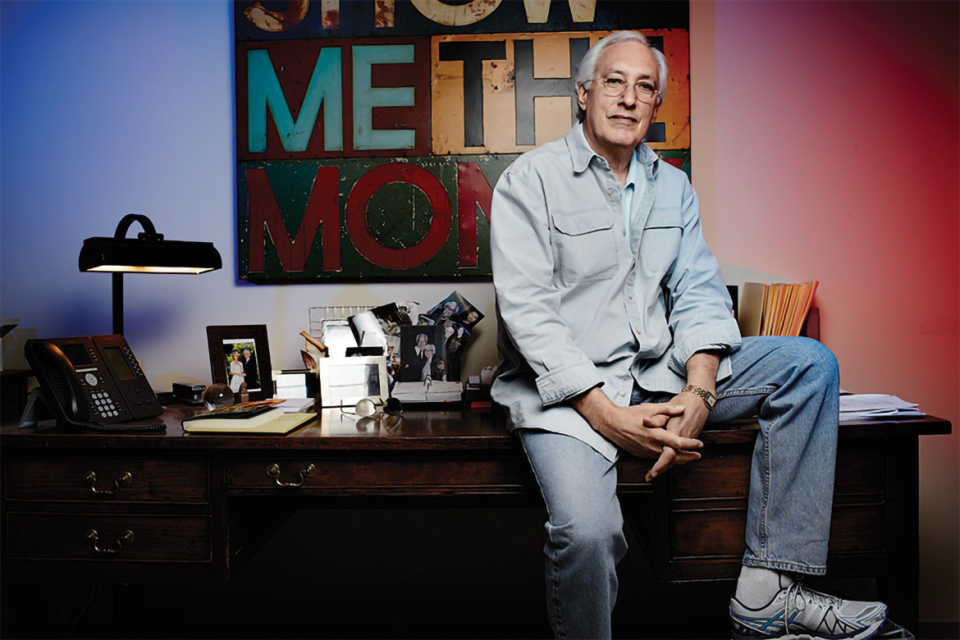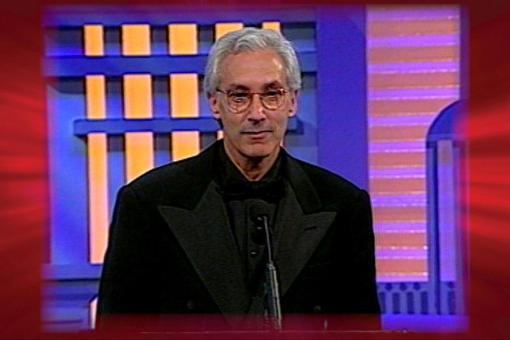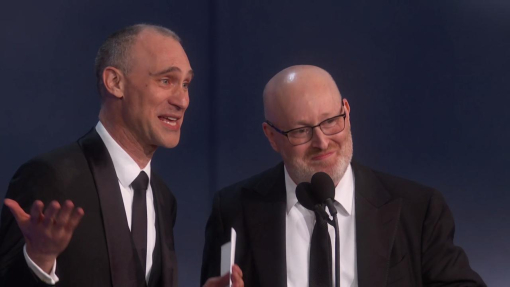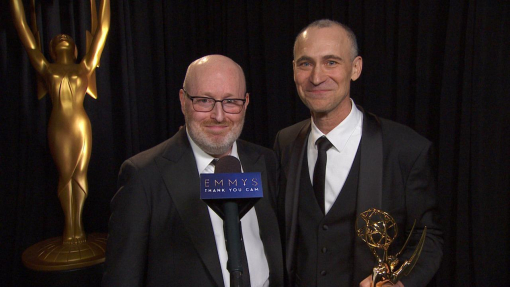Steven Bochco died on Passover.
There’s a joke he used to tell: a blind man is at a seder . somebody passes him a piece of matzoh . the blind man says, “who wrote this shit?”
Steven loved telling Jewish jokes in the writers’ room. Often they were thematically related to a story we were breaking, but sometimes it was just to lighten the mood.
Steven’s room was a beautiful place to be.
I met Steven when our mutual agent, Joe Cohen, sent a script of mine to his wife and producing partner, Dayna, who read it, liked it and passed it along to Steven. They called me in for what I thought was a general meeting and turned out to be an interview to write for a new show of theirs at FX, Over There.
I wound up writing three of those scripts, developing a pilot with Steven and working with him on ABC’s Commander in Chief and then again on TNT’s Raising the Bar.
But far more important than any project, Steven became my friend and my mentor — the guy I’d call for advice on how to run a show or when I was struggling with a story. Over lunch, we’d talk not just about work, but about family and real estate and marriage and kids. We talked about my father’s long illness and then his death.
Steven was always… there.
When I was running shows, I would call Steven for advice — and sometimes just to hear his voice (in a way, his voice was his best form of advice, because it always gave me a sense of confidence).
Confidence was one of Steven’s many superpowers. And his surety inspired his writers. He was Steven Bochco, after all. If he believed in you, if he knew in his bones that you could write the script, who the hell were you to question that?
Sometimes — if I had an issue on a show and didn’t want to bug him — I would just close my eyes and ask myself: “W.W.S.D?” (What Would Steven Do?) Usually, an answer would form, and I would know that everything would be okay.
When I was running Dirt for FX, I reached out to Steven to ask if there was anything I should keep in mind to do the job really well.
He told me: “Remember, there’s no Emmy for ‘On Time and On Budget.’ Don’t be afraid to shut down if the scripts aren’t ready. If the scripts aren’t there, you won’t have anything .”
Steven taught me not to have an assistant take notes in the writers’ room. He believed the writer of the episode should be the custodian of the story. Besides, if ideas are good, they won’t be forgotten.
“If we don’t remember it the next day,” he said, “it wasn’t worth remembering.” He never rewrote his writers’ scenes unless there was a specific reason to do so that he could clearly articulate. I realized early on this meant I should bring my A game to every first draft. If the first draft worked, that would be the script that got shot.
And if it didn’t work, he was tremendously supportive in making it better. He once told me that he only hired writers he believed in, so if a scene didn’t work after a pass or two, it wasn’t likely to be the writer’s fault: it was almost always a problem in the story.
For Steven, the writers’ room was a sacred place, a place where we could share anything without embarrassment, knowing that our personal stories would stay protected within its walls. There, in that safe space, we could openly explore our lives and experiences, and in them, we’d find story.
We were productive, but there were no late nights in a Bochco writers’ room. We always broke for a good lunch to talk about other things. I’d been quite a workaholic until that time, and seeing Steven achieve so much so efficiently was an inspiration.
When I asked him about it, he said he’d come to believe that writers are most productive in bursts of a few hours and there was no point in running a room into a place of diminishing returns.
While he was laser-focused in breaking story, he knew when to turn the room in different directions. It would sometimes seem like we had all diverted our energies to talk about our parents or kids or college crushes or childhood humiliations, but it was just Steven knowing when to throttle down and change gears. We’d come back the next day more productive than ever.
Once, when he helped reconceive a script that hadn’t been working, I gushed a little too much about his story changes, which had sent me off in the right direction. He just shrugged and said, “You know what they say — the three most important things in television: story, story, story.“
I remember another time in the writers’ room when a story had been pitched and two writers began to argue about it. The way the room worked was that script assignments circulated clockwise, and though I thought this idea was pretty interesting, the writer who was due for the next script really dug into the argument against it.
Steven let the debate go on for no more than three minutes and then said, “Let’s not do this one.“ That was the end of the argument, and we were on to another idea.
Interesting, I thought, to let such a good story evaporate instead of dealing with the conflict in the room. Maybe there’s a lesson here. Then, about two weeks later, the script rotation landed on me. A few ideas were kicked around and then Steven gave a puzzled look, as if trying to recall something, and said, “What was that story we were talking about a few weeks back…?“
The writer who’d argued so furiously against the idea was occupied with his own assignment, and the next thing I knew, I was writing that script. There was a lesson there, all right. It was Steven’s genius at work, guiding not only the right stories, but the most constructive process through which those stories could blossom.
Breaking story with Steven was amazing. I never could tell if his hand was so steady because he’d been down so many story roads (and the inevitable blind alleys) that he knew them all, or because he was just a flat-out story genius. Probably both. Whatever it was, it was a thing to behold.
Steven’s technique was deceptively simple: find a story you’re excited to tell. Then find the scenes in that story you really want to see (he called them: Scenes We Want To See). Jot down those scenes as one-sentence bullet points. Put those points in an order you find natural and compelling. There. Now you’ve got your story.
By the time i got to know him, Steven had experienced more success than anyone could reasonably imagine: he had found Dayna, he’d won Emmy awards (ultimately, he would be nominated 34 times and win 10 Emmys; he was also inducted into the Television Academy Hall of Fame) and he had created and run so many hit shows, changing the face of television drama.
And yet, Steven was open and honest and always present. He was happy to read scripts and offer notes. He answered calls and emails the same day. I called him when I was negotiating a big deal and he talked me through not only strategy, but emotion — how I might look deeper, at the big picture of it in my life.
This availability and openness was a gift enjoyed by many. He seemed to love being a mentor.
The last big piece of advice I got from Steven was about endings. I called him as Joe Weisberg and I were closing in on the ending of our FX series The Americans. I wanted Steven’s take on ending a series well (the end of NYPD Blue remains one of the greatest ever).
Steven listened for a while, then asked a few questions: did Joe and I have an ending in mind? How long had we thought about it? How did we feel about it?
I answered all his questions. Steven listened further and then said, “You’re doing it just right — you’re going to be fine.” He paused and added, “You want advice? My advice is, plan a nice vacation for yourself and the family after you wrap. You all deserve it.”
I was on that family vacation, in San Francisco’s Chinatown, when I got the news about Steven. If anyone reading this was in Hunan Home’s Restaurant on Jackson Street on April 1, now you know why that guy suddenly started crying into his dumplings.
Steven will be missed by so many, but I’m sure no one will miss him more than his children, whom he loved so much, and, of course, Dayna. Whenever Steven talked about Dayna, it was with a love full of respect and admiration. I was just about to get married when I met Steven, and it struck me early on that his and Dayna’s was a marriage to emulate.
He was a son to emulate, as well. He and Dayna moved his mother, Mimi, into their home when she got older and they cared for her through her final years.
Steven was also incredibly gracious with my mother. I once took her to the Bochco home for a civil rights fundraiser and he made a point of praising me in front of her. He knew what it meant for a mother to hear nice things about her son from a man like him.
I wish he’d been able to know my father. They were a lot alike: two larger-than-life personalities, beloved public figures who knew how to balance their role in the world with the close family and friends they loved. It never occurred to me that Steven had become a father figure to me. I never thought of myself as needing another father figure — I loved my dad and always felt he was more than enough.
Looking back on it, the bulk of my connection with Steven took hold after my father suffered a massive stroke, which is when I lost him in the most significant ways.
Perhaps on some level, Steven sensed that I needed a father figure in my life. Maybe he just liked being a friend and mentor. Maybe he just liked me. At the end of the day, it doesn’t matter. One of the greatest lessons I learned from Steven is that what matters — in drama as in life — is how people behave. Steven always behaved like he loved me. And I loved him.
Steven would often say about story: “don’t die with your secret.” What he meant was, don’t be so subtle with your storytelling that people don’t get what you mean. Don’t outsmart yourself being clever; make sure your intention lands. Thanks to Steven, i think about this a lot when calibrating scenes and even whole seasons.
Whether he was writing a script, running a show, offering sage advice or just sharing over lunch, Steven would always tell it like he saw it. Anyone who knew him, or his work, knew what he thought about the world. Steven died too soon, but he didn’t die with any of his secrets.
There’s a reason he titled his autobiography Truth Is A Total Defense. He believed deeply in truth. It wasn’t a defense for him — it was who he was. It was how he looked at the world. More than anything, he wanted to see and express things truthfully.
Maybe that’s what made him such a great writer. It certainly made him one of the greatest people I’ve ever known.
I’ve been sitting here for a long time now, staring at my computer screen, drafting and then deleting various endings to this. Nothing I put down seems to do justice to Steven. Nothing seems fitting for him. I close my eyes. I think, “What Would Steven Do?“
He would tell me that I’m doing it just right. That I’m going to be fine. Anyone who knew him, anyone who watches television, anyone who is touched by culture — we will all still have him. We’ll be more than fine: we’re all blessed to have had him in our world.
Joel Fields is an executive producer of The Americans.
This article originally appeared in emmy magazine, Issue No. 5, 2018






